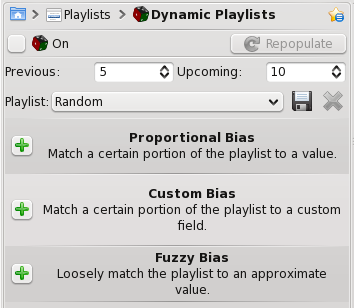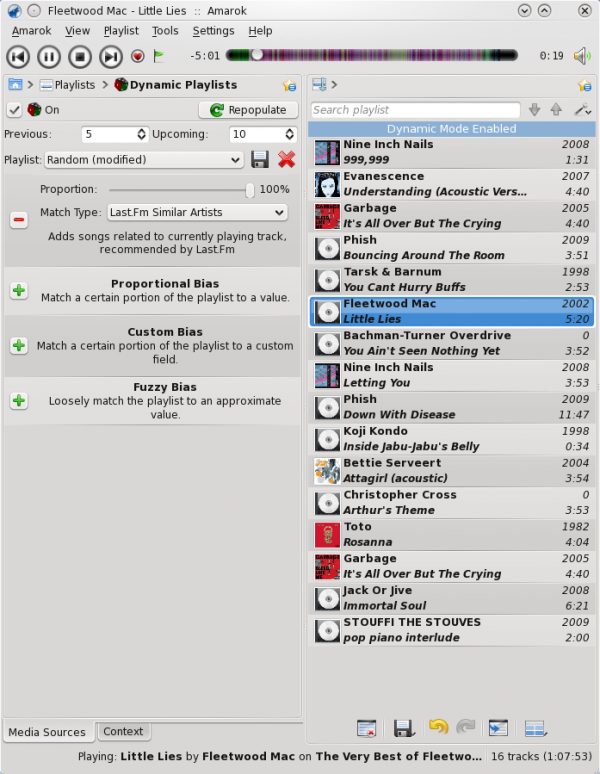Amarok/Manual/Playlist/DynamicPlaylists: Difference between revisions
m fixed the TODO - need a 2.4 image |
m grammar, formatting |
||
| Line 11: | Line 11: | ||
If you have used another media player before you are probably familiar with the concept of having all of your music in a single playlist, then playing it in random order. | If you have used another media player before you are probably familiar with the concept of having all of your music in a single playlist, then playing it in random order. | ||
If you've tried this in '''Amarok''', especially if you have a larger collection, you may have realized that that way of managing your playlist doesn't work well. This page will explain how to use '''Amarok's | If you've tried this in '''Amarok''', especially if you have a larger collection, you may have realized that that way of managing your playlist doesn't work well. This page will explain how to use '''Amarok'''<nowiki>'s</nowiki> ''Dynamic Playlist'' feature, a better way to explore your music. | ||
To | To go to the ''Dynamic Playlist'' window, go to <menuchoice>Playlists -> Dynamic Playlists</menuchoice> from the root of the ''Media Sources'' pane. | ||
[[Image:Dynamic_playlist.png]] | [[Image:Dynamic_playlist.png]] | ||
==Biases== | ==Biases== | ||
Biases are what makes your dynamic playlist special! The default value for the dynamic playlist, without any biases, is random play. Biases of various sorts will alter that in different ways. | Biases are what makes your dynamic playlist special! The default value for the dynamic playlist, without any biases, is random play. Biases of various sorts will alter that in different ways. | ||
| Line 25: | Line 24: | ||
===Custom Bias=== | ===Custom Bias=== | ||
This is where | This is where you will find the new last.fm and Echo Nest biases. Use last.fm or Echo Nest to bias the playlist towards artists who are similar to either the currently playing artist, your weekly top artists in Last.fm, or for Echo Nest, the current playlist as a whole. | ||
This function will use whatever song is playing when the playlist is repopulated so your music evolves as you listen, while remaining somewhat similar to whatever is currently playing. | This function will use whatever song is playing when the playlist is repopulated so your music evolves as you listen, while remaining somewhat similar to whatever is currently playing. | ||
| Line 32: | Line 31: | ||
Fuzzy bias will match an approximate value and has a strictness field, as opposed to a percentage one. More strictness means more exact matches. | Fuzzy bias will match an approximate value and has a strictness field, as opposed to a percentage one. More strictness means more exact matches. | ||
The resulting playlist will consist of tracks | The resulting playlist will consist of tracks normally distributed around the requested value. | ||
==Using your Dynamic Playlist== | ==Using your Dynamic Playlist== | ||
| Line 39: | Line 38: | ||
The default number of items in the playlist is your 5 previous plays plus 10 upcoming items. With the currently playing track, this makes 16 items in the playlist at any given time. This number can be changed right below the <menuchoice>On</menuchoice> checkbox. | The default number of items in the playlist is your 5 previous plays plus 10 upcoming items. With the currently playing track, this makes 16 items in the playlist at any given time. This number can be changed right below the <menuchoice>On</menuchoice> checkbox. | ||
Below that are is the dropdown menu for loading saved playlists, the <menuchoice>Save</menuchoice> button | Below that are is the dropdown menu for loading saved playlists, the <menuchoice>Save</menuchoice> button, and the <menuchoice>Delete</menuchoice> button. | ||
==A dynamic playlist in use== | ==A dynamic playlist in use== | ||
Revision as of 22:45, 31 December 2010
Dynamic Playlists
Introduction
If you have used another media player before you are probably familiar with the concept of having all of your music in a single playlist, then playing it in random order.
If you've tried this in Amarok, especially if you have a larger collection, you may have realized that that way of managing your playlist doesn't work well. This page will explain how to use Amarok's Dynamic Playlist feature, a better way to explore your music.
To go to the Dynamic Playlist window, go to from the root of the Media Sources pane.
Biases
Biases are what makes your dynamic playlist special! The default value for the dynamic playlist, without any biases, is random play. Biases of various sorts will alter that in different ways.
Proportional Bias
Proportional biases match a certain portion of the playlist to a specific value, such as Artist, Composer, Title, Genre, Year, etc. This function uses specific values, in contrast to the Fuzzy Bias.
Custom Bias
This is where you will find the new last.fm and Echo Nest biases. Use last.fm or Echo Nest to bias the playlist towards artists who are similar to either the currently playing artist, your weekly top artists in Last.fm, or for Echo Nest, the current playlist as a whole.
This function will use whatever song is playing when the playlist is repopulated so your music evolves as you listen, while remaining somewhat similar to whatever is currently playing.
Fuzzy Bias
Fuzzy bias will match an approximate value and has a strictness field, as opposed to a percentage one. More strictness means more exact matches.
The resulting playlist will consist of tracks normally distributed around the requested value.
Using your Dynamic Playlist
To enable the dynamic playlist you have created simply check the box in the upper-left corner of the pane. To regenerate the entire playlist at any time, click , to the right of .
The default number of items in the playlist is your 5 previous plays plus 10 upcoming items. With the currently playing track, this makes 16 items in the playlist at any given time. This number can be changed right below the checkbox.
Below that are is the dropdown menu for loading saved playlists, the button, and the button.




